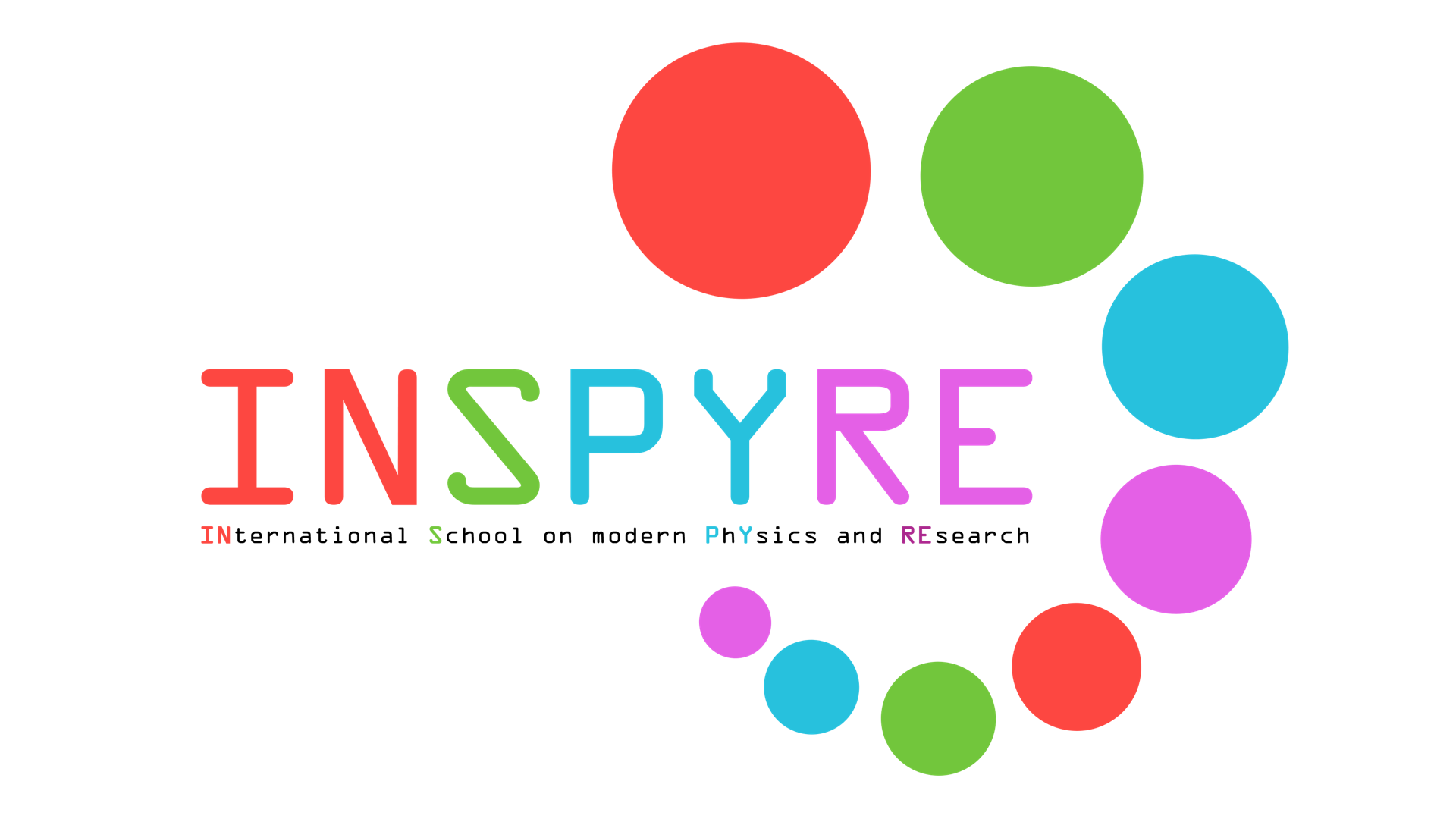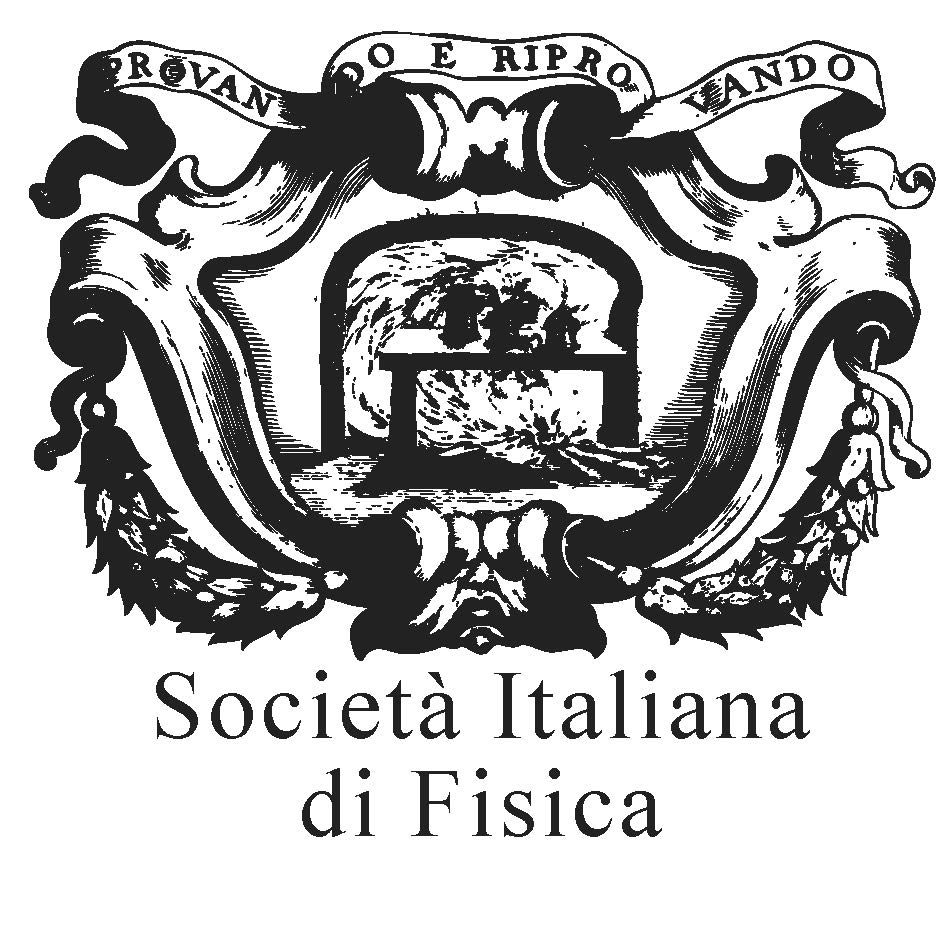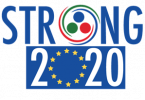INternational School on modern PhYsics and REsearch
- Frascati, April 8 – 12, 2024
The 2024 edition of INSPYRE, the INternational School on Modern PHYsics and REsearch, will be held at Frascati National Laboratory (LNF) from 8 to 12 April 2024.
During the school, participants will experience a full immersion in physics and in the world of scientific research.
For Italian students, INSPYRE will count as a 36-hour “PCTO” course.

Lessons - Monday, April 8
Basic concepts of accelerators (D. Alesini, INFN-LNF)
David Alesini
David Alesini is Senior Technologist at LNF, expert in design, implementation and operation of particle accelerators, RF, beam dynamics.
He is the coordinator of the INFN-Accelerators Committee
Basic concepts of particle detectors (D. Domenici, INFN-LNF)
Danilo Domenici
Experimental physicist, he is a researcher at the Frascati National Laboratory of the Italian National Institute of Nuclear Physics. He designs, builds, and operates particle detectors to study the differences between matter and antimatter (LHCb at CERN and KLOE in Frascati), to search for dark matter (PADME in Frascati), and to understand more about neutrinos (DUNE at Fermilab). At the same time, he tries to communicate the wonders of science to the public through seminars, educational workshops, and engaging lessons aimed at both adults and children
Nuclear Physics application in everyday life – Sara Pirrone (INFN Catania) & Giovanni Casini (INFN Firenze)
Sara Pirrone
INFN- Senior Researcher of INFN’s Catania Section
Her research activity is in the field of experimental nuclear physics and is primarily aimed at the study of reaction mechanisms and dynamic processes in collisions between heavy ions at low and intermediate energies (10-100 AMeV). She is also a Member of the Consiglio di Presidenza of the Italian Physical Society.
Giovanni Casini
G.C is staff memeber of the INFN Sezione di Firenze since 1990 and since end 2022 he is Director of
Reasearch of INFN. He got the Ph.D on Physics at the Florence University in 1990 with a Thesis on experimental
heavy-ion studies. The latter general subject has been since then his main reasearch field. In
particular, he has given contributions (more than 90 papers) on several aspects of the nuclear reaction
mechanisms with fixed target experiments, at energies from the Coulomb barrier to the highest cyclotron
limit (100MeV/u). Among the main results there are the detailed description on the neutron-proton equilibration
during the heavy-ion reactions, the formation and the isotopic composition of fragments that are
emitted in the violent collisions at different timescales; the accurate investigation of those aspects allows
to improve the knowledge of the Nuclear Equation of State of nuclei far from ground state, approximating
the conditions, for instance, that characterize the explosive phases of astrophysical systems. During
his career G.C. was involved in many scientific, steering and organizing committees from local to international
ones; he also have had many service roles in the INFN infrastructures and National Laboratories.
Part of his activity has been also devoted to educational objective and to the science communication.
Lessons - Tuesday, April 9
Basic concepts of the Standard Model (P. Gianotti, INFN-LNF)
The discoveries and theories developed by a long list of physicists over the last and current century have resulted in a remarkable insight into the fundamental structure of matter: everything in the universe is found to be made from a few basic building blocks called fundamental particles, governed by four fundamental forces. Our best understanding of how these particles and three of these forces are related to each other is synthesized in the Standard Model of particle physics. Organically developed in the early 1970s, it has successfully explained almost all experimental results and precisely predicted a wide variety of new phenomena. Over time and through many experiments, the Standard Model has nowadays become a well-tested physics theory.
The lecture will historically introduce the basic concepts of the Standard Model and will give some perspectives on unresolved questions currently under investigation in fundamental physics research.
Paola Gianotti
Paola Gianotti is a senior researcher of INFN’s Frascati National Laboratory. Since the beginning of her career, she has been interested in the study of hadronic physics. She started her scientific activity at CERN in Geneva working on various experiments in this scientific field and in 1993 she became staff at the research division of the LNF. She studied hypernuclei at DAFNE with the FINUDA experiment, and in recent years she moved to study dark matter with the PADME experiment.
Messanger from the space: from gravitational waves to neutrinos (V. Fafone, INFN-Roma Tor Vergata & Sarah Louise Mancina – Padova University
Viviana Fafone
Graduated in Physics cum laude in 1991. Research scientist of the INFN (National Institute of Nuclear Physics) atthe Frascati National Laboratories from 1994 to 2005. Associate Professor of Astronomy and Astrophysics at theUniversity of Rome Tor Vergata since 2005
Sarah Louise Mancina
Sarah Mancina is a postdoctoral researcher at the University of Padova working on searches for astrophysical neutrinos sources with the IceCube neutrino observatory. She is originally from northern California and did her Bachelors at the University of Chicago before starting a PhD program at the University of Wisconsin–Madison. She initially became interested in neutrinos when she did an internship through the US DOE at Argonne National Laboratory during her bachelor’s. She began working on IceCube for her PhD (in the US, master’s and PhD are usually combined for physics). She decided to do a postdoc outside of the US because it is a short-term temporary position and she always wanted to experience life abroad. Besides the physics, her favorite parts of working on IceCube are the people and getting to visit the diverse places where IceCube research occurs.
Lessons - Wednesday, April 10
Approaching to the theory of quantum mechanics by means of simple experiments on light polarization – Marisa Michelini (Udine University)
Marisa Michelini
Marisa Michelini is Senior Professor of Physics Education in the University of Udine, where was rectore delegate from 1994 to 2021, head of the Physics Department from 2004 to 2010 and director of the university School of Specialization for Secondary School Teachers (SSIS) of the Udine University (2003-2007). She is president of the scientific committee of the Italian university consortium GEO and president of the PER Italian network (CooFIS08). She is scientific responsible of the chain “Challanges in Physics Education” of Springer and editor in different international Journals.
President of International Research Group on Physics Education (GIREP) from 2012 up to 2023, she is board member of PED Section of European Physical Society (EPS) from 2016. honorary member of the Italian Association for Physics Teaching (AIF). She founded the Center for Research in Education (CIRD), Lab Center for Physics Education (CLDF), the Center for Guidance (CORT), the Research Unit in Physics Education (URDF), the first Italian PhD in Physics Education. As a member of the Committee of European Science Education Research Association (ESERA) organized the ESERA PhD Summer School in 2010 and later play the role of strand responsible for Teacher Education in three ESERA Congresses (2011-2013-2015).
Her research activity is on research in electrical transport properties of thin films (1985-2000) and physics education research carried out continuously during the entire career. She was principal investigator of 2 EU Projects and responsible of the Italian Unit for 5 other EU Projects. She carried out 32 national projects and 15 Regional projects in physics education research. She received two main Awards: a) 1989 Italian Physical Society Award for the Exhibit Games Experiments Ideas; b) 2018 IUPAP-ICPE international award for the research in physics education. Research activity is documented by over 700 peer review selected publications in books or journals.
The second quantum revolution and quantum computing – Angelo Bassi (Trieste University, INFN Trieste)
We will present the fundamental principles and groundbreaking potential of quantum computing. By utilizing superposition and entanglement, quantum computers process information in ways fundamentally different from classical computers. Through simple examples, we will explain why this is possible and how it is achieved, while also touching on the current status of quantum computing and future research directions.
Angelo Bassi
Angelo Bassi received his PhD in Physics in 2001 from the University of Trieste. Subsequently he was Post-Doctoral Fellow and Visiting Scientist at the ICTP of Trieste, and Marie-Curie Fellow at the Ludwig-Maximillian University of Munich. He is now full professor at the Physics Department of the University of Trieste. His research concerns the foundations of quantum mechanics. He is the author of over 150 publications, invited speaker at over 70 international conferences, organizer of 30 conferences. He has been invited to present his research in the most important institutes in the world (including MIT, Harvard, Columbia University, NYU, Princeton). He is the winner and coordinator of numerous national and international research projects, raising over 7 M€. He was interviewed by New York Time Magazine with a dedicated profile (June 2020), and by several other international scientific magazines. He is collaborator of La Repubblica, for which he writes about Quantum Physics and Quantum Technologies.
Quantum mechanics and quantum computing – Marisa Michelini (GIREP, Udine University), Lorenzo Santi (Udine University), Angelo Bassi (Trieste University, INFN Trieste)
Angelo Bassi
Angelo Bassi received his PhD in Physics in 2001 from the University of Trieste. Subsequently he was Post-Doctoral Fellow and Visiting Scientist at the ICTP of Trieste, and Marie-Curie Fellow at the Ludwig-Maximillian University of Munich. He is now full professor at the Physics Department of the University of Trieste. His research concerns the foundations of quantum mechanics. He is the author of over 150 publications, invited speaker at over 70 international conferences, organizer of 30 conferences. He has been invited to present his research in the most important institutes in the world (including MIT, Harvard, Columbia University, NYU, Princeton). He is the winner and coordinator of numerous national and international research projects, raising over 7 M€. He was interviewed by New York Time Magazine with a dedicated profile (June 2020), and by several other international scientific magazines. He is collaborator of La Repubblica, for which he writes about Quantum Physics and Quantum Technologies.
Marisa Michelini
Marisa Michelini is Senior Professor of Physics Education in the University of Udine, where was rectore delegate from 1994 to 2021, head of the Physics Department from 2004 to 2010 and director of the university School of Specialization for Secondary School Teachers (SSIS) of the Udine University (2003-2007). She is president of the scientific committee of the Italian university consortium GEO and president of the PER Italian network (CooFIS08). She is scientific responsible of the chain “Challanges in Physics Education” of Springer and editor in different international Journals.
President of International Research Group on Physics Education (GIREP) from 2012 up to 2023, she is board member of PED Section of European Physical Society (EPS) from 2016. honorary member of the Italian Association for Physics Teaching (AIF). She founded the Center for Research in Education (CIRD), Lab Center for Physics Education (CLDF), the Center for Guidance (CORT), the Research Unit in Physics Education (URDF), the first Italian PhD in Physics Education. As a member of the Committee of European Science Education Research Association (ESERA) organized the ESERA PhD Summer School in 2010 and later play the role of strand responsible for Teacher Education in three ESERA Congresses (2011-2013-2015).
Her research activity is on research in electrical transport properties of thin films (1985-2000) and physics education research carried out continuously during the entire career. She was principal investigator of 2 EU Projects and responsible of the Italian Unit for 5 other EU Projects. She carried out 32 national projects and 15 Regional projects in physics education research. She received two main Awards: a) 1989 Italian Physical Society Award for the Exhibit Games Experiments Ideas; b) 2018 IUPAP-ICPE international award for the research in physics education. Research activity is documented by over 700 peer review selected publications in books or journals.
Lorenzo Gianni Santi
Associated professor (sector FIS/01, Experimental Physics) at the Udine University.
The scientific activity followed two main streams.
Since 1986, with prevalent involvement till 2005 and continuing in present, it involved research in the field of Experimental physics of the elementary particles, touching also some topics in nuclear and atomic physics. At present, I collaborate to the Muon g-2 at Fermilab (measure of the anomalous magnetic dipole moment of muons).
Since 1993, scientific activity was devoted also in the Physics Education Research, mostly regarding on topics related to curricular development and teacher formation. In this framework, I performed research in national and international projects, focusing on the topics of the curricular development, teacher training and innovative didactic paths for laboratory activities.
The scientific activity is documented by more than 300 referred papers at international level.
Lessons - Thursday, April 11
Artificial intelligence – Alberto Pace (CERN)
Alberto Pace
Alberto Pace is a member of the IT department at CERN where he leads the Compute and Devices group. The group provides, operates, and maintains the scientific computing services and infrastructure needed by the laboratory and its experiments to accomplish their mission. The group manages end-users desktop and mobile devices and supports the needed operating systems as well as deploys and configure core productivity applications and software licenses.
For several years, Alberto has led the Storage group ensuring a coherent development process for Physics Data management activities, strongly driven by operational and user needs. He also represents CERN in the Advisory Board of the Internet Society (isoc.org) and the World Wide Web Consortium (w3c.org). He has more than 30 years experiences in computing services, infrastructure, software engineering, accelerator control and accelerator operation. He graduated in Electronic Engineering from Politecnico di Milano (Italy) in 1987, where he received the first prize among Electronic Engineering students of the North Italy section
Artificial intelligence: application and significance – Sascha Schmeling and Alberto Pace (CERN)
Alberto Pace
Alberto Pace is a member of the IT department at CERN where he leads the Compute and Devices group. The group provides, operates, and maintains the scientific computing services and infrastructure needed by the laboratory and its experiments to accomplish their mission. The group manages end-users desktop and mobile devices and supports the needed operating systems as well as deploys and configure core productivity applications and software licenses.
For several years, Alberto has led the Storage group ensuring a coherent development process for Physics Data management activities, strongly driven by operational and user needs. He also represents CERN in the Advisory Board of the Internet Society (isoc.org) and the World Wide Web Consortium (w3c.org). He has more than 30 years experiences in computing services, infrastructure, software engineering, accelerator control and accelerator operation. He graduated in Electronic Engineering from Politecnico di Milano (Italy) in 1987, where he received the first prize among Electronic Engineering students of the North Italy section
Sascha Schmeling
Sascha Schmeling is head of teacher and student programmes at CERN, chairs the CERN Council forum on teacher and student affairs, and is chairperson of the EPS physics education division.
Lessons - Friday, April 12
Extreme Gravity – Paolo Pani (Sapienza University)
Einstein’s General Relativity is one of humankind’s greatest achievements and has revolutionized our understanding of the universe. In recent years, it has become possible to test the most extreme predictions of this beautiful theory and their impact on cosmology and astrophysics. One of the most striking predictions, the existence of black holes, is playing a crucial role in many different areas of physics. We will present the basic ingredients of General Relativity, the concept of black holes, and will overview timely areas of research in this field.
Paolo Pani
Paolo Pani is Full Professor of Theoretical Physics at Sapienza University of Rome. He is the recipient of the SIGRAV Prize 2016 and an ERC Fellow in 2017. He published a textbook on General Relativity and almost two hundred papers on black hole physics, gravitational wave phenomenology, and their connections to fundamental physics.
What is yet to be discovered (including dark matter) – Catalina Curceanu (INFN-LNF) & Tommaso Marchi (INFN LNL)
Catalina Curceanu
Catalina Curceanu is director of research of INFN, Frascati National Laboratories, where she leads a group of about 20 researchers which performs advances experiments using cutting edge technologies both in the field of nuclear physics, as well as in quantum foundations. Author of more than 400 scientific articles, Catalina is member of the Foundational Questions Institute (FQXi); she leads European and international projects, such as QUBO funded by the John Templeton Foundation and ICON, funded by the Foundational Questions Institute (FQXi). For her activity Catalina has received the Emmy Noether award of the European Physical Society, and was nominated by the President of Romania Knight of Romania, with the “cultural merit” order for scientific merits. She is the author of the book “From black holes to hadrontherapy. A journey into Modern Physics” (Springer – I Blu).
Tommaso Marchi
Tommaso Marchi obtained a PhD in Experimental Nuclear Physics at the University of Padova in 2013, then moved to Belgium as a EU-Marie Curie Fellow at KU Leuven. Since 2017 he is a researcher at Legnaro National Laboratories (INFN, Italy). Tommaso’s research focuses on the mechanisms driving heavy-ion Nuclear Reactions and on the structure of exotic Nuclei. He has been involved in the development of Active Target detectors to be used at Radioactive Ion Beam facilities and in February 2023 he has been appointed as Leader of the SPES project at LNL.
With the support of
With the cooperation of
Under the patronage of






